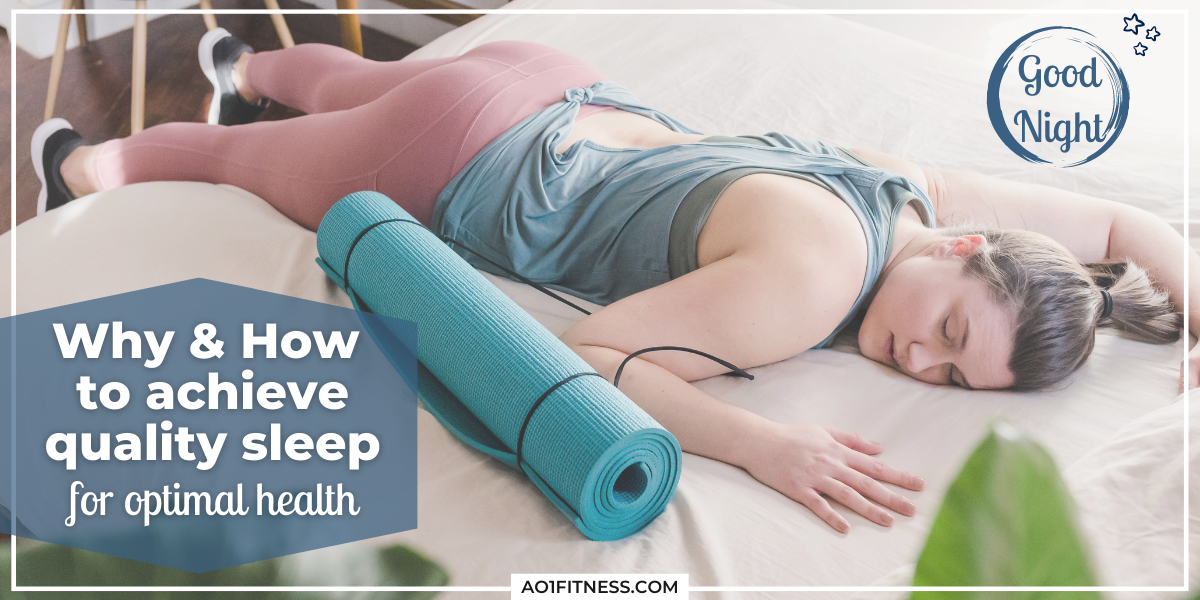Health Benefits of Quality Sleep

Are you exercising, eating clean and still gaining weight? As a fitness and nutrition coach, my next two questions are, how is the quality of your sleep and mindset?
Those two factors play a larger role in our health journey than we give credit for.
Let’s dive into the first question about sleep.
Did you know that lack of sleep
- Induces sugar cravings (your body is looking for quick sources of energy)
- Increased fat storage and lack of human growth hormone* (see below why this is key)
- Increases stress induced obesity (a hormonal condition)
If you are not getting a consistent, deep, quality sleep of 7-9hrs, your health (and weight loss goals) could be poorly affected.
Why? Your body does a lot of work while you sleep!
Quality sleep will
- Increase glucose metabolism. If you don’t get enough sleep, it is harder to metabolize the glucose coming into your system
- Regulates neurotransmitters responsible for appetite (leptin & ghrelin)
- Boosts Human Growth Hormone* (regulates belly fat and metabolism)
- Repairs and mends injuries
- Normalizes cortisol during the day
- Improves memory

*Human Growth Hormone is super important for overall health, playing a vital role in cell regeneration, growth and maintaining healthy human tissue, including that of the brain and various vital organs.
HGH is made by the pituitary gland, located at the base of the brain.
HGH helps children grow taller, increases muscle mass, and decreases body fat. HGH also helps control the body’s metabolism—the process by which cells change food into energy and make other substances that the body needs. HGH also plays a role in your mental health… promoting healing in your mood and cognition. It’s a positive cycle with sleep.
HGH is produced during peak hours of the night and the more HGH you have, the more restorative your sleep becomes.
**Other than sleep, human growth hormone can naturally be increased through high intensity exercise. Research suggests that the exercise-induced growth hormone plus endurance exercise associated with load, intensity, duration and frequency are the determining factors in the regulation of HGH secretion. An exercise intensity above lactate threshold and for a minimum of 10 minutes elicits the greatest stimulus to the secretion of HCH. HIIT workouts are effective in promoting beneficial well-being, health and positive training outcomes, while stimulating HGH.
We don’t want you to stress about not getting enough sleep… that won’t help 🙂
Consistent sleep routines can help us achieve quality sleep. We need to proactively create a wind-down routine that will create the environment for deep restorative sleep.
Here are our Top Sleep Prep Routine Tips:
- Keep a regular sleep schedule:
- Big swings in your sleep schedule or trying to catch up on sleep after a week of late nights can cause changes in metabolism and reduce insulin sensitivity, making it easier for blood sugar to be elevated.
- Wind down with a calming activity in dim lights 30-60min before bed (bath, journaling, or reading).
- No screens or bright lights at least an hour before bed (tv, computer, phone, etc).
- Your sleep environment should be completely dark and cool (less than 67F). Use blackout curtains and unplug or cover every light source. You can also consider wearing a soft eye mask to further block out light.
- Consider using a white noise machine. They create a consistent environment and drown out sudden sounds like car horns or snoring that could wake you up. We used these for our babies to sleep and noticed that we slept better with them as well! Even when travelling, we bring a white noise machine for consistent sound to cue our brains it’s time to sleep.
- The last thing you should fall asleep to is a positive thought. Consider reading something that is uplifting to your spirit or practice gratitude or prayer. If thoughts of worry or fear come up, write them down and tell yourself you will deal with it tomorrow.
- If you sense you have any further tension, do some slow purposeful deep breathing or muscle relaxation exercises.
- Timing: we won’t tell you when to go to bed, but based on your normal wake time count back 8-9 hours. Set your routine early enough so you have enough time to wind down and are in bed with the opportunity to sleep 7-9hrs. We can’t force ourselves to sleep but we can create the opportunity and consistent environment and routine to set ourselves up for success.
- Note that extra cortisol can rise in the evening if we stay up too late (2nd wind) or are exposed to blue light. If you are currently staying up too late and want to create an earlier routine, start incrementally moving back 15min every week. Our bodies like habits and routines; take small but consistent steps towards your goal.
Some other great practices to wind down before bed are deep breathing, taking a relaxing bath (Epsom salts are full of magnesium and can further promote muscle relaxation), reading, and stretching.
The more we can calm our mind, our nervous system, and relax our muscles, the better we can enter into deep, quality sleep.
Try this 5 min stretching session as part of your nightly routine:
Studies to support the information in this blog about healthy sleep:
https://pubmed.ncbi.nlm.nih.gov/15583226/
https://www.ncbi.nlm.nih.gov/pmc/articles/PMC4308960/pdf/nihms595693.pdf
https://pubmed.ncbi.nlm.nih.gov/27117840
https://pubmed.ncbi.nlm.nih.gov/25450058
https://diabetesjournals.org/diabetes/article/59/9/2126/14525/Sleep-Restriction-for-1-Week-Reduces-Insulin
https://pubmed.ncbi.nlm.nih.gov/18517032/
https://pubmed.ncbi.nlm.nih.gov/8627466/
https://pubmed.ncbi.nlm.nih.gov/10984255/
https://pubmed.ncbi.nlm.nih.gov/33440789/
https://pubmed.ncbi.nlm.nih.gov/14655916/


